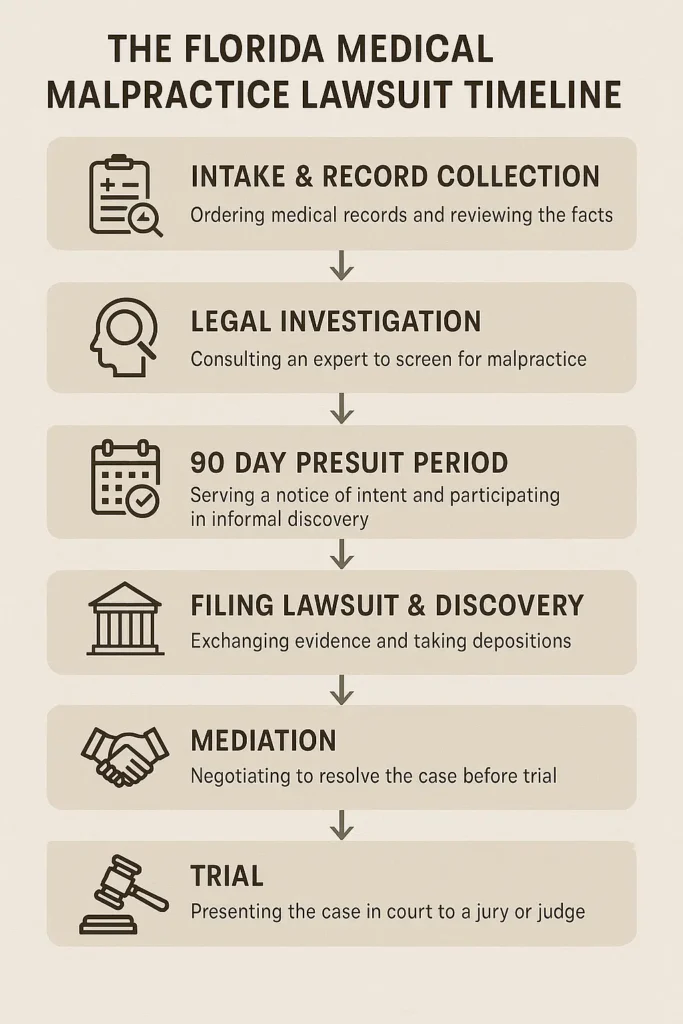When you’ve been hurt by a medical error, the legal process can feel like a maze. While every case is different, Florida law sets out a predictable path. Here’s what that journey looks like step by step so you know what’s coming and why each stage matters.
Quick reality check on deadlines. In Florida, most medical malpractice claims must be brought within 2 years of when the injury occurred or should reasonably have been discovered, and no later than 4 years from the malpractice itself (a “statute of repose”). Fraud, concealment, or intentional misrepresentation can extend the outside limit to 7 years. For minors age eight or younger, special rules apply. These rules live in § 95.11(4)(b), Florida Statutes.
The Stages: Guardrails Deadlines, Tolling & Calendar Strategy
Before anything else, we map the calendar. Florida law allows two important timing tools:
90 day presuit tolling: Once a valid Notice of Intent to Initiate Litigation is served, the statute of limitations is tolled for 90 days while the defense investigates. After presuit ends, you get the greater of 60 days or the time remaining on the limitations period to file suit.
Automatic 90 day extension: Separate from tolling, your attorney may file a simple petition with the clerk for an automatic 90 day extension to finish investigating before suit. This 90 days is added to the limitations period.
Stage 1: Intake, Record Collection & Early Screening
We start with your story and your records. We order the full chart from every provider involved and reconstruct the medical timeline. The goal is to see whether the facts could meet Florida’s legal standard and to spot any statute of limitations issues early. (HIPAA and state law give you access to your own records; we help make those requests complete and organized.)

Stage 2: Formal Legal Investigation & Expert Review
Florida requires a reasonable investigation before filing suit. Practically, that means we consult a qualified medical expert who reviews the records and if appropriate signs a verified written medical expert opinion confirming reasonable grounds for a malpractice claim. This corroborating opinion must accompany the presuit notice.
Florida also sets who can serve as your expert:
If the defendant is a specialist, the expert must practice in the same specialty and have been in active practice, teaching, or clinical research in that specialty within the last 3 years.
For general practitioners, the look back period is 5 years.
Comparable rules apply to other licensed providers.
These qualification rules are in § 766.102, and “medical expert” is defined in § 766.202.
Good faith certification. When a lawsuit is later filed, the complaint must include counsel’s certificate that a reasonable investigation supports a good faith belief in negligence another Florida specific requirement.
Stage 3: Florida’s 90 Day Presuit Process
Before filing suit, we must serve a Notice of Intent to Initiate Litigation on every prospective defendant. That notice includes the expert’s corroboration, key medical records, and a HIPAA authorization in the exact statutory format. This service triggers a mandatory 90 day investigation period for the insurer and pauses filing.
- During presuit, Florida allows informal discovery without court involvement:
- Unsworn statements of parties and treating providers
- Document production (with deadlines)
- One physical/mental exam when appropriate
- Written questions (≤ 30, incl. subparts)
These tools help both sides evaluate the claim early; failure to cooperate can trigger sanctions or dismissal of claims/defenses.
By day 90, the defense must reject the claim, offer to settle, or admit liability and offer to arbitrate damages. If the claim is rejected (including by silence), we can proceed to court; if an arbitration offer under § 766.207 is made, we’ll discuss pros/cons before deciding.
Stage 4: Filing the Lawsuit & Discovery
If presuit doesn’t resolve the case, we file in the appropriate Florida circuit court. From there, the longest phase begins: discovery, the formal exchange of evidence under court rules. Expect:
- Interrogatories (sworn written questions)
- Requests for production (policies, protocols, records, audit trails, device data)
- Requests for admissions (to narrow what’s disputed)
- Depositions (sworn testimony of you, providers, and experts)
- Presuit materials generally remain confidential and inadmissible; discovery is a fresh, formal record for trial.
Stage 5: Mandatory Mediation (and Settlement Conferences)
Florida law requires in person mediation in medical negligence suits typically within 120 days after filing unless the parties agree otherwise. Many circuits also require a court ordered settlement conference before trial. Mediation is confidential and aims to resolve the case without the risk and cost of a jury verdict.
Stage 6: Trial (and Sometimes Appeal)
If the case doesn’t settle, we try it. A Florida trial includes jury selection, opening statements, witness testimony (including experts on both sides), and closing arguments. The jury decides liability and, if applicable, damages. Either side can seek post trial relief or appeal. (In a limited subset of cases, parties may choose voluntary binding arbitration of damages under § 766.207, which has different procedures and effects.)
Special Situations to Know About
Birth Related Neurologic Injuries (NICA). Certain obstetric brain injury claims are handled through an administrative compensation program with its own deadlines and procedures, separate from court. We screen for NICA early so you don’t lose rights by taking the wrong path.
Government Defendants. Claims involving state entities follow additional rules under § 768.28 and may affect notice and damages; we account for that when planning presuit and litigation strategy.

The Big Picture
A Florida medical malpractice case is a marathon of preparation: records, expert review, the 90 day presuit process, formal discovery, and required mediation then trial if needed. Understanding the sequence (and the deadlines) can reduce uncertainty and help you make informed decisions at every step.
If you’re in Miami Dade or anywhere in South Florida, we’re ready to walk you through this timeline as it applies to your facts and providers.
Legal Sources Referenced
- Statute of limitations & repose: § 95.11(4)(b), Fla. Stat.; discussion of tolling/extension mechanics.
- Presuit notice, tolling & informal discovery: § 766.106; HIPAA authorization form: § 766.1065.
- Expert corroboration & definitions: §§ 766.203, 766.202.
- Expert qualifications & standard of care: § 766.102.
- 90 day clerk extension & good faith investigation: § 766.104.
- Mandatory mediation / settlement conferences: § 766.108.
- Voluntary binding arbitration: § 766.207.
Attorney Bio: Jorge L. Flores, Florida Bar No. 53244, has been representing families in Miami Dade for over 30 years.
Disclaimer: This overview is general information, not legal advice. Deadlines and procedures can change based on facts and parties. For guidance on your specific situation, contact a Florida medical malpractice attorney.
